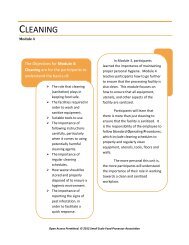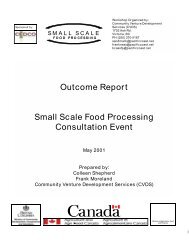Here - Small Scale Food Processor Association
Here - Small Scale Food Processor Association
Here - Small Scale Food Processor Association
Create successful ePaper yourself
Turn your PDF publications into a flip-book with our unique Google optimized e-Paper software.
Are You<br />
Protected?<br />
By Don Radford, MBA, FCIP, CCIB, CRM<br />
Have you ever considered what<br />
would happen if someone became sick or<br />
even worse, become disabled or died, from<br />
consuming your product(s)? This risk exists<br />
every time one of your products is sold.<br />
Our laws state that we have a legal obligation<br />
to be aware of the losses we cause and<br />
when losses happen, compensate those who<br />
suffer as a result. We are required to take all<br />
reasonable measures to reduce the risk of<br />
loss by others arising from that enterprise.<br />
You can and need to protect yourselves<br />
from being held liable; you have a legal<br />
obligation to do so. It first starts with demonstrating<br />
an ability and attempt to manage<br />
your risks. This happens when reasonable<br />
care is taken every time you prepare, store,<br />
transport and display your products. Keeping<br />
records about the conditions food was<br />
processed also demonstrates due diligence.<br />
This way if someone does claim injury,<br />
you have evidence to show what you did to<br />
prevent or avoid any foreign substance from<br />
contaminating the process. This is called loss<br />
prevention.<br />
Loss prevention and insurance are individual<br />
parts of an overall management process<br />
called risk management. Loss prevention<br />
happens before a loss occurs. Insurance<br />
happens only after something goes wrong.<br />
The real benefit of liability insurance is that<br />
it pays for a defence and if necessary, pays<br />
for the financial consequences of a claim or<br />
lawsuit.<br />
Liability insurance pays for a defence to<br />
allegations of negligence, even when they are<br />
either false or fraudulent. If those allegations<br />
are proven in court, liability insurance pays<br />
for the negative financial consequences as<br />
awarded by that court.<br />
When a claim does occur, your actions<br />
will be compared to what is called the “reasonable<br />
and prudent man.” This standard is<br />
defined by our courts to determine whether<br />
or not someone is negligent (i.e., did not<br />
perform up to that standard) and is therefore<br />
liable. Negligence is based on legal concepts<br />
of fault. It means that someone either failed<br />
to do something they should have or did<br />
something they should not have. Negligence<br />
is determined by our courts by considering:<br />
• Was the danger foreseeable? (you have<br />
a duty to be aware, did you breach that<br />
duty?)<br />
• Was the conduct within acceptable standards?<br />
(did you live up to the standards?)<br />
• Was a management process in effect<br />
and used? (did you follow all processing<br />
standards?)<br />
• Did danger exist for an unreasonable time<br />
(if you knew about it, did you fix it?)<br />
• The ease of preventing the danger (what<br />
did you do to prevent it from happening?)<br />
The more information you can provide<br />
about how you manage risk, the more insurers<br />
take that into account, which results in<br />
lower insurance costs and in some cases,<br />
coverage that is not normally provided, such<br />
as product recall.<br />
Even with due diligence, a claim can still<br />
come forth from someone consuming your<br />
product. The questions is, do ypu have the<br />
right insurance, what does it cover and is it<br />
enough?<br />
This type of claim is known as a product<br />
liability. Insurance coverage is found<br />
for these claims through a policy called the<br />
Commercial General Liability (CGL), which<br />
is designed to respond to claims on behalf of<br />
a commercial venture when someone other<br />
than yourself, your immediate family or your<br />
employees suffers damage to their property<br />
and/or suffers physical injury after using<br />
your product, service, facility, etc.<br />
The CGL provides insurance for your<br />
product liability by first, defining your products<br />
as:<br />
“Any goods or products, other than real<br />
property, manufactured, sold, handled,<br />
distributed or disposed of by:<br />
1. You<br />
2. Others trading under your name<br />
3. A person or organization whose business<br />
or assets you have acquired; and containers<br />
(other than vehicles), materials,<br />
parts or equipment furnished in connection<br />
with such goods or products.”<br />
“Your product” includes warranties<br />
or representations made at any time with<br />
respect to the fitness, quality, durability or<br />
performance of any of the items.<br />
It’s also very important to know how<br />
far or if there are any territorial limitations<br />
which could reduce the coverage. What is<br />
unique about products is once they are sold,<br />
the manufacturer has no control over where<br />
they are consumed. That is why product liability<br />
is defined by the CGL with a coverage<br />
territory of:<br />
“All parts of the world if the injury or<br />
damage arises out of:<br />
1. Goods or products made or sold by you<br />
in the territory described or<br />
2. The activities of a person whose home is<br />
in the territory described in above, but is<br />
away for a short time on your business.”<br />
So, what insurance should you have?<br />
Consider your size, type of products, what<br />
types of product liability claims that have<br />
occurred and what amounts have been<br />
paid. You will need to choose for yourself<br />
what limit to insure, that you feel would be<br />
adequate. When you seek out terms for this<br />
insurance ask for a variety of limits of insurance.<br />
Then you will know what the costs are<br />
in relation to the limits that are available.<br />
Whatever the limit of insurance<br />
you choose, the insurance coverage<br />
you should not be without as a food<br />
processor is the Commercial General<br />
Liability (CGL). ■<br />
Don Radford is the Corporate Account Manager<br />
in Western Canada for the Cooperators<br />
General Insurance Company. He has been in<br />
the Commercial Insurance business for over<br />
30 years and is currently licensed in all four<br />
western provinces.<br />
www.ssfpa.net 15















